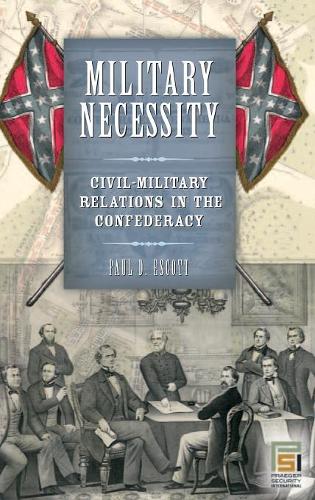
Military Necessity: Civil-Military Relations in the Confederacy
(Hardback)
Publishing Details
Military Necessity: Civil-Military Relations in the Confederacy
By (Author) Paul D. Escott
Bloomsbury Publishing PLC
Praeger Publishers Inc
30th January 2006
United States
Classifications
General
Non Fiction
Military history
973.742
Physical Properties
Hardback
236
Width 156mm, Height 235mm
510g
Description
Never before or since in American history have the needs and influence of the military weighed so heavily on society. Escott analyzes the militarization of life in the Confederacy and probes the relationships between military commanders, legislators, and Jefferson Davis and his administration. As the South struggled to wage an exhausting war against the North, military necessity increasingly determined policy and shaped all aspects of life. The military had an increasingly large impact not only on policy but also on events inside civil society. Military men played important roles in bringing about extensive social change, enforcing law and order, and placing significant restrictions on individual freedoms. Ultimately the crisis of the Confederacy threatened both the constitutionalism that southern politicians long had cherished and a core principle of the tradition of civil control over the military. Key figures in the army also took the lead in urging the use of slaves as soldiers and promoting the idea of emancipation. With many portraits of high-ranking generals and civil officials and telling anecdotes that reveal the nature of their relationships, this book reveals the depth of the Confederacy's social, political, and military crisis and highlights what this crisis revealed about the foundations of Confederate society.
Reviews
Escott, author of several major works on the history of the US South and the Civil War, examines the relationship between civil and military authority in the Confederacy during the Civil War. In this recent entry to a series on the larger subject of US civil-military relations, Escott finds that the pressures of war on a smaller, less industrialized, less modernized society forced Confederate leaders to make increasingly difficult decisions about the role of the military in a nation dedicated to civilian control of the military. When faced with the possibility of defeat and extinction, the Southern nation depended increasingly on military answers and seriously eroded the traditional US allegiance to civilian superiority. Indeed, this erosion was deeper than at any other moment in US history. Still, the Confederacy became neither a police state nor a dictatorship, and neither Jefferson Davis nor Robert E. Lee would consider becoming a dictator, though some urged them to do so. This is a clearly written, sensibly argued, and valuable perspective on the Civil War period. Illustrations, maps, endnotes. Recommended. Professionals, graduate students, and undergraduates. * Choice *
Escott has added an undeniably fresh dimension to our understanding of the familiar by showing the extent to which the military fashioned pivotal civilian policies..[H]is analysis is reasonable and balanced, his interpretation containing much truth. * Civil War History *
Escott is to be commended for adopting an expansive definition of civil-military relations in guiding his research. Instead of focusing solely on the interaction between the formalized institutions of the Confederacy, his survey embraces a multitude of questions arising from the broader dynamic of modern warfare's demands upon a democracy. In crisp and well-reasoned prose he draws upon much recent scholarship into Confederate governance, producing a work that rewards scholars and enthusiasts alike. * On Point: The Journal of Amry History *
Over the course of the Civil War, military necessity increasingly determined policy in the South. In this text for scholars and interested general readers, Escott analyzes the militarization of civil society in the Confederacy and explores the relationships between military commanders, legislators, and the Jefferson Davis administration. The focus is on the conflict that arose between those who favored a strict adherence to the Confederate Constitution and those who argued for the subordination of certain individual and state rights during wartime. The volume is illustrated with B&W portraits of the leaders profiled. * Reference & Research Book News *
Any studying Confederate military history and experience will want to place Paul D. Escott's Military Necessity: Civil-Military Releations in the Confederacy on their reading list as something a bit out of the ordinary. No light coverage, Professor Escott's history analyzes how life was militarized in the Confederacy and considers the evolving relationships between commanders, legislators, and Jefferson Davis' administration as the South entered war times and hardships. The military had a big impact on policy and also on civil society: MILITARY NECESSITY charts these changes and documents crisis points and relationships between military and civil society. * California Bookwatch *
Author Bio
Paul D. Escott is Professor of History at Wake Forest University. His publications include books and articles on the Confederacy, the South, and on African American history.
